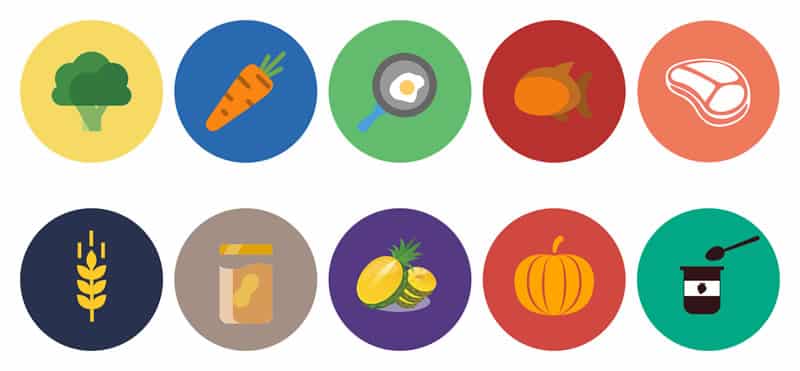Top 10 Best Foods to Feed Your Dog
Liz Mallia2020-09-23T11:22:14+02:00
By
Liz Mallia
Diet, Dog Parenting Center, Health care, Useful tipps
best, dog, feed, food, top 10
1 Comment
A good diet is essential for your dog’s health. If in doubt, you should always consult your vet for recommendations about the best food for your dog. However, there are a surprising number of food stuffs that are both safe and healthy for your dog.
Here are the top ten best foods to feed your dog:

Meat
Dogs are what we call “facultative carnivores”. This means that dogs evolved to eat meat primarily. As such, feeding your dog meat is one of the healthiest diet options. Packed with protein, meat is ideal because it allows the dog to exercise his jaw muscle and can help to keep the dog’s teeth clean. Most dogs also appreciate some juicy, tasty meat!
You can feed most meat raw, including chicken. Cooked meat is also fine, but never feed cooked bones. Chicken bones are particularly dangerous, as these can splinter in the dog’s digestive tract and severely damage their gut.

Fish
Your dog may also enjoy fish occasionally. Salmon and tuna are ideal for dogs, as both types of fish contain omega-3 fatty acids. Some effects of omega-3 fatty acids include helping to promote joint health, improving the immune system, and keeping your dog’s coat healthy and shiny. Canned tuna often contains some mercury and sodium, so it should be fed in moderation. Do not give your dog tuna that has been kept in oil, as the oil can upset the dog’s digestive system. Salmon should be cooked to avoid the risk of internal parasites – so no sushi for Fido. Try to remove any small bones to prevent choking.

Unsalted peanut butter
Many dogs love the taste of peanut butter, so this is an ideal treat. Peanut butter is packed with vitamins and minerals, such as Vitamins E and B, protein, beneficial, and niacin. You can give your dog small amounts as a treat, or place in it a plastic dog toy to give your dog some mental stimulation. Be careful never to feed your dog peanut butter that contains Xylitol, as this artificial sweetener is toxic to dogs.

Egg
There is some debate as to whether you can feed your dog raw eggs, or if it’s better to stick with cooked eggs; however, feeding cooked eggs helps you to avoid health problems such as Salmonella. You can prepare eggs in a variety of ways, such as scrambled or boiled, though fried eggs should be avoided. Eggs also provide your dog with protein, riboflavin (Vitamin B2, which is important for energy metabolism), and selenium (important for thyroid health and Antioxidant protection).

Oatmeal
Oatmeal is found in plenty of commercial dog foods. It contains lot of fibre, so it’s ideal for any dog with gut and bowel problems, and also good for older dogs or dogs that are allergic to wheat and other grains. It should be served cooked (but not too hot!) and without sugar.

Yoghurt
Natural yoghurt is a good snack for dogs. It contains plenty of protein and calcium. Certain types of natural yoghurt also act as probiotics: they encourage healthy microorganisms in your dog’s digestive system, which can improve its function. Be aware that some dogs are lactose intolerant, so you may need to ask your veterinarian for advice before you feed any dairy products to your dog.

Carrot
As we mentioned before, dogs are facultative carnivores, so although their diet should be mostly meat, you can add vegetables and fruit to give your dog a more varied and healthy diet. Raw carrots are good for your dog’s teeth. They are also packed with fibre, which helps to keep the digestive system healthy, and Vitamin A, which is good for your dog’s eyes. They are also low in calories, so make a good snack when your dog needs to lose weight.

Pineapple
Small amounts of pineapple provide your dog with the enzyme bromelian, which improves the dog’s ability to digest protein. It also provides manganese, magnesium, vitamins B and C, and energy-producing thiamine. Pineapple can also be beneficial for dogs that eat their own faeces, as it makes the latter taste bad. Avoid feeding too much pineapple, as too much sugar is bad for your dog’s health.

Pumpkin
Fresh or canned pumpkin is filled with Vitamin A (important for eyesight, as well as the function and maintenance of organs such as the heart and lungs), and fibre. It’s great for dogs with digestive problems, but avoid sugared or spiced pumpkin, as spices such as cinnamon are not healthy for dogs.

Broccoli
As a child, you may have slipped your dog unwanted food from your plate, such as broccoli. You may have actually done your dog a favour, as small amounts of broccoli can be very healthy for dogs. Steamed broccoli can lower cholesterol and promote detoxification within the body. It also provides Vitamin D, A, and K. Avoid feeding too much broccoli, because this can irritate your dog’s digestive tract.





















